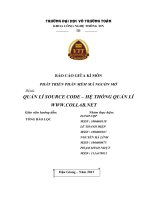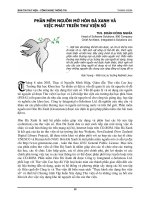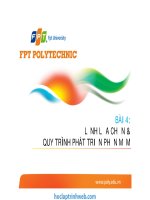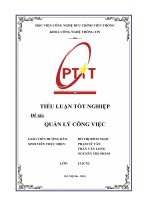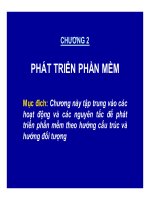Bài giảng Phát triển phần mềm nguồn mở Bài 3 Nguyễn Hữu Thể
Bạn đang xem bản rút gọn của tài liệu. Xem và tải ngay bản đầy đủ của tài liệu tại đây (263.67 KB, 17 trang )
PHÁT TRIỂN PHẦN MỀM NGUỒN MỞ
PHP Standards Recommendations
Nguyễn Hữu Thể
Content
Basic Coding Standard
Coding Style Guide
Logger Interface
Autoloading Standard
Caching Interface
HTTP Message Interface
2
Index by Status (Accepted)
Num Title
Editor
Coordinator
Sponsor
1
Basic Coding Standard
Paul M. Jones
N/A
N/A
2
Coding Style Guide
Paul M. Jones
N/A
N/A
3
Logger Interface
Jordi
Boggiano
N/A
N/A
4
Autoloading Standard
Paul M. Jones
Phil Sturgeon
Larry Garfield
6
Caching Interface
Larry Garfield
Paul
Dragoonis
Robert Hafner
7
HTTP Message
Interface
Matthew
Weier
O'Phinney
Beau
Simensen
Paul M. Jones
Larry Garfield
Matthew
Weier
O'Phinney
Marc
Alexander
13
Hypermedia Links
/>
3
PSR-1: Basic Coding Standard
1. Overview
Files MUST use only
Files MUST use only UTF-8 without BOM for PHP code.
Files SHOULD either declare symbols (classes, functions,
constants, etc.) or cause side-effects (e.g. generate output, change
.ini settings, etc.) but SHOULD NOT do both.
Namespaces and classes MUST follow an "autoloading" PSR:
[PSR-0, PSR-4].
Class names MUST be declared in StudlyCaps.
Class constants MUST be declared in all upper case with underscore
separators.
Method names MUST be declared in camelCase.
4
PSR-1: Basic Coding Standard
SHOULD NOT
SHOULD
// side effect: change ini settings
ini_set('error_reporting', E_ALL);
// declaration
function foo()
{
// function body
}
// side effect: loads a file
include "file.php";
// side effect: generates output
echo "<html>\n";
// declaration
function foo()
{
// function body
}
// conditional declaration is *not* a side
effect
if (! function_exists('bar')) {
function bar()
{
// function body
}
}
5
PSR-1: Basic Coding Standard
Namespace and Class Names
Namespaces and classes MUST follow an "autoloading" PSR:
[PSR-0, PSR-4].
Class names MUST be declared in StudlyCaps.
// PHP 5.3 and later:
namespace Vendor\Model;
class Foo
{
}
6
PSR-1: Basic Coding Standard
Class Constants, Properties, and Methods
The term "class" refers to all classes, interfaces, and traits.
Class constants MUST be declared in all upper case with
underscore separators.
namespace Vendor\Model;
class Foo
{
const VERSION = '1.0';
const DATE_APPROVED = '2012-06-01';
}
7
PSR-1: Basic Coding Standard
Properties
• This guide intentionally avoids any recommendation
regarding the use of $StudlyCaps, $camelCase, or
$under_score property names.
Methods
• Method names MUST be declared in camelCase().
8
PSR-2: Coding Style Guide
Code MUST use 4 spaces for indenting, not tabs.
There MUST NOT be a hard limit on line length; the soft limit
MUST be 120 characters; lines SHOULD be 80 characters or
less.
There MUST be one blank line after the namespace
declaration, and there MUST be one blank line after the block
of use declarations.
Opening braces for classes MUST go on the next line, and
closing braces MUST go on the next line after the body.
Opening braces for methods MUST go on the next line, and
closing braces MUST go on the next line after the body.
9
PSR-2: Coding Style Guide
Control structure keywords MUST have one space after them;
method and function calls MUST NOT.
Opening braces for control structures MUST go on the same
line, and closing braces MUST go on the next line after the
body.
Opening parentheses for control structures MUST NOT have a
space after them, and closing parentheses for control
structures MUST NOT have a space before.
10
namespace Vendor\Package;
use FooInterface;
use BarClass as Bar;
use OtherVendor\OtherPackage\BazClass;
class Foo extends Bar implements FooInterface
{
public function sampleMethod($a, $b = null)
{
if ($a === $b) {
bar();
} elseif ($a > $b) {
$foo->bar($arg1);
} else {
BazClass::bar($arg2, $arg3);
}
}
final public static function bar()
{
// method body
}
}
PSR-3: Logger Interface
The LoggerInterface exposes eight methods to write logs to
the eight RFC 5424 levels (debug, info, notice, warning, error,
critical, alert, emergency).
A ninth method, log, accepts a log level as the first argument.
Calling this method with one of the log level constants MUST
have the same result as calling the level-specific method.
Users SHOULD NOT use a custom level without knowing for
sure the current implementation supports it.
12
PSR-4: Autoloader
The term "class" refers to classes, interfaces, traits, and other
similar structures.
A fully qualified class name has the following form:
\<NamespaceName>(\<SubNamespaceNames>)*\<ClassName>
The fully qualified class name MUST have a top-level
namespace name, also known as a "vendor namespace".
The fully qualified class name MAY have one or more subnamespace names.
The fully qualified class name MUST have a terminating class
name.
13
PSR-4: Autoloader
Underscores have no special meaning in any portion of the
fully qualified class name.
Alphabetic characters in the fully qualified class name MAY
be any combination of lower case and upper case.
All class names MUST be referenced in a case-sensitive
fashion.
When loading a file that corresponds to a fully qualified class
name ...
14
PSR-4: Autoloader
The contiguous sub-namespace names after the "namespace
prefix" correspond to a subdirectory within a "base directory",
in which the namespace separators represent directory
separators. The subdirectory name MUST match the case of
the sub-namespace names.
The terminating class name corresponds to a file name ending
in .php. The file name MUST match the case of the
terminating class name.
Autoloader implementations MUST NOT throw exceptions,
MUST NOT raise errors of any level, and SHOULD NOT
return a value.
15
PSR-6: # Introduction
The goal of this PSR is to allow developers to create
cache-aware libraries that can be integrated into
existing frameworks and systems without the need
for custom development.
16
PSR-7: HTTP message interfaces
This document describes common interfaces for
representing HTTP messages as described in :
• RFC 7230
• RFC 7231,
• URIs for use with HTTP messages as described in RFC
3986.
HTTP messages
development.
are
the
foundation
of
web
• Web browsers and HTTP clients such as cURL create HTTP
request messages that are sent to a web server, which
provides an HTTP response message.
• Server-side code receives an HTTP request message, and
returns an HTTP response message.
17

